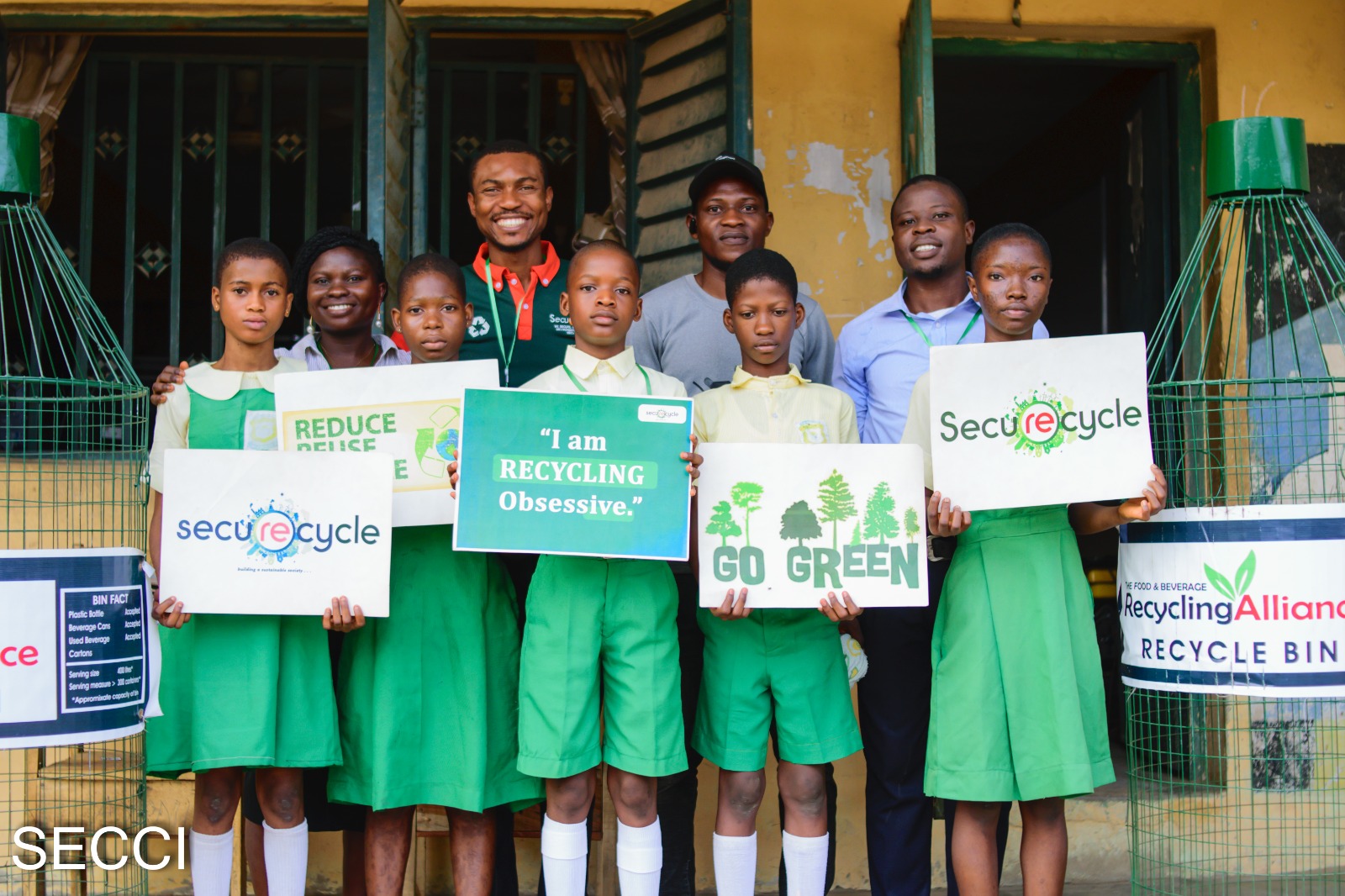While growing up, Kilaso Emmanuel Ola saw first-hand the problem of poor waste management bedevilling local communities in Nigeria. With these disturbing experiences, he made up his mind to offer solutions.
In 2018, before Kilaso graduated from Ladoke Akintola University of Technology, his passion for environmental conservation led him to start the Securecycle Environmental and Climate Change Initiative, or SECCI, a non-profit organisation committed to promoting environmental sustainability and raising awareness about the impacts of climate change. It was fully registered with the Corporate Affairs Commission, or CAC, in November 2019.
“I started the initiative to see how, as young people, we can stop complaining about problems and move forward to doing the work that betters communities whenever we have the opportunity to do so,” Kilaso said.
In its efforts to shape a sustainable environment, SECCI launched a climate education project tagged Eco-Clubs. The project’s primary aim is to create environmental awareness in young minds across Abeokuta in Nigeria’s Ogun State.
While implementing the project, SECCI wrote to the Ogun State Basic Education Board about its plans, and after getting permission, they moved towards action.
“Our goal is to drive a student-led environmental club where student agencies are developed towards addressing environmental challenges in their communities,” Kilaso told Prime Progress.
Through engaging classroom discussions and practical projects, elementary and secondary school students are allowed to learn about the planet’s critical issues, including climate change, pollution, and habitat loss.
Beyond the classroom, the students carry out community-based projects that include awareness campaigns, tree planting, and recycling drives.
“These practical experiences not only deepen their understanding but also equip them with the skills needed to implement real-world environmental solutions,” said Mohammed Taoheed, Communication Officer of the organisation.
The Eco-Clubs project, which started in 2021, featured various schools in Abeokuta, each having a coordinator that guides the students through the climate education curriculum.
In getting the activities up and running, SECCI occasionally invites climate experts to train the students.
“We have established representatives (mainly teachers and senior students) in the schools to keep on with the initiatives,” Taoheed admitted.
It’s making an impact
Ranking Nigeria among the countries vulnerable to climate change brings the critical need for action towards addressing the issues. However, as of 2020, Statista revealed that more than six Nigerians out of 10 had never heard of climate change, hence the demand to create more awareness on the topic.
A teacher at Abeokuta Grammar School, Sammani Emmanuel, is one of many who implemented the Eco-Club in his school after receiving training from SECCI.
“We have been training the students in environmental protection and how to recycle plastic containers and ensure that materials such as jeans and tyres can be made useful again,” Sammani said.
The students of Abeokuta Grammar School are now becoming environmental stewards who are conscious of hazardous activities that can harm their environment.
“We also guide them on how to keep the environment clean by shunning the dropping of nylon and plastic materials in public places,” Sammani told Prime Progress.
Kehinde Kasali is another teacher who led the implementation of the Eco-Club at Gateway Secondary School, Ita-Iyalode, Abeokuta. With his unwavering dedication and passion for promoting a sustainable environment, he gave all he could towards the success of the project.
“I taught the students many things that include water hygiene, proper disposal of waste, and the planting of common vegetables, trees, and ornamental plants,” Kehinde said. “We also train them on how to tturn theirused and neglected clothing materials, such as Jean materials, into usable products such as bags and purses.”
However, the impacts of the Eco-Clubs extend from the commitments of teachers and students to parents and community leaders whose collective efforts promote environmental conservation in Nigeria’s Ogun State.
“The Eco-Clubs are sowing seeds for a more sustainable future. It’s our vision to see that the knowledge, values, and skills acquired by the club members continue to influence their choices and actions as they grow into adulthood,” Taoheed expressed to Prime Progress.
Challenges
Lack of adequate funds limits the number of schools and communities the project can reach. However, SECCI is struggling with short-staffed and poor technical resources, which continue to delay the implementation of some of its projects.
“Mobilizing public support and engagement hasn’t been easy. Also, raising awareness about climate issues and finding motivating individuals and communities that are willing to take action is a challenge,” Kilaso highlighted.
Kilaso further notes that the organisation hopes to expand the reach and impact of its activities to see more individuals and communities continue to participate fully in tackling environmental issues.
The organisation is also trying to become a social enterprise. “We can’t continue tto relyon grants alone before we carry out activities. We are now producing jeans bags that we sell at a premium so we can raise money to fund our projects,” he concluded.
Kilaso Emmanuel Ola, motivated by poor waste management in Nigerian communities, founded the Securecycle Environmental and Climate Change Initiative (SECCI) in 2018. SECCI, aimed at environmental sustainability and climate change awareness, was officially registered in 2019. Kilaso initiated Eco-Clubs to educate youth in Ogun State on environmental issues, involving them in practical projects like tree planting and recycling. These clubs are fostering environmental consciousness among students and have extended impact through community involvement.
Challenges faced by SECCI include inadequate funding, staffing, and technical resources, hindering broader reach. Despite difficulties, the organization aspires to expand its impact and is transitioning towards self-sustenance by creating revenue through social enterprise activities, such as selling premium jeans bags.






